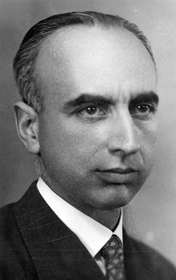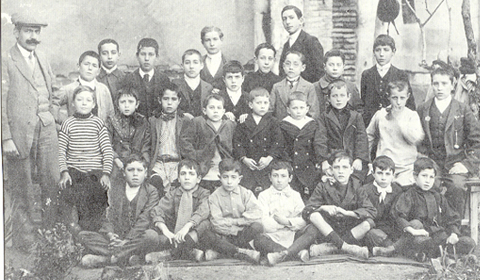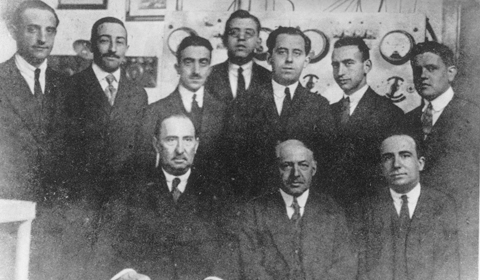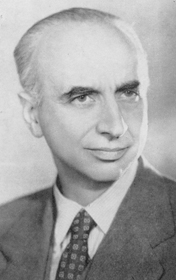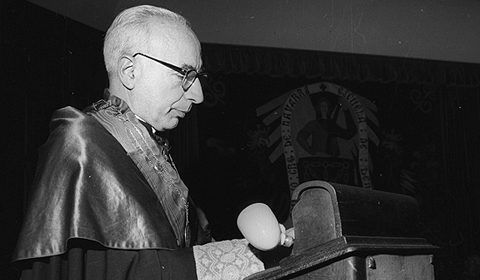Profile of Professor Albareda
José María Albareda Herrera (Caspe, 1902-Madrid, 1966) was the son of a pharmacist and showed a precocious literary and political inclination, which found a breeding ground in the family environment. His father, in addition to being a pharmacist, was a promoter of agricultural improvements and the establishment of small industries in rural areas, a leader of the Catholic agricultural trade union and a militant in the incipient Christian Democrat movement.
|
|
|
With a penchant for scientific research, José María wanted to study chemistry, but he followed his father's pragmatic approach and studied pharmacy in Madrid. graduate in 1922, he then began to study chemistry in Zaragoza, where he obtained a teaching post place teaching assistant in 1926. There he prepared his first doctoral dissertation, which he defended in Madrid in 1927. At that time, the so-called Central University was the only centre where it was possible to obtain a doctoral degree.
This circumstance is related to José María Albareda's first publication: Biología Política (Political Biology) of 1923. It was a defence of political decentralisation and management assistant as a way of overcoming the resistance to development that the precocious author detected. Moved by this interest, Albareda joined Aragonist movements and the Partido Social Popular, the first Christian Democrat party. In keeping with family tradition, he was also a man of deeply-rooted religious beliefs.
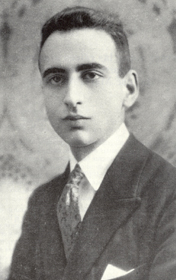
Portrait of José María Albareda, after obtaining his double university degree licentiate degree |
|
Already a doctor, and graduate in chemistry, he was attracted to research. The difficulties he encountered in finding a position that would allow him to devote himself to it prompted him to take the competitive examinations for Full Professor of high school, which he won in 1928. That same year he applied for a pension to extend his programs of study studies abroad.
The body that provided this aid at the time was the Junta para Ampliación de Estudios (JAE), a pioneer in the state promotion of research. Between 1928 and 1930, José María Albareda enjoyed his first boarding house in Bonn, Zurich - at its prestigious Polytechnic - and Könisberg. These stays gave rise to his specialisation in soil chemistry, topic , which was doubly dear to him because of his interest in chemical research and because of the practical effects he envisaged after this work: he wanted to modernise the Spanish countryside.
On his return he prepared a second doctoral dissertation in 1931. The following year he went abroad again to spend two years in soil physics and chemistry research laboratories in the United Kingdom (Rothamsted Experimental Station). In the summer of 1934 he travelled to other soil research centres in central Europe: Berlin, Leipzig, Dresden, Prague and Budapest. In this way he accumulated an important background in the physical-biological study of soils, and was filled with the desire to imitate what he had seen.
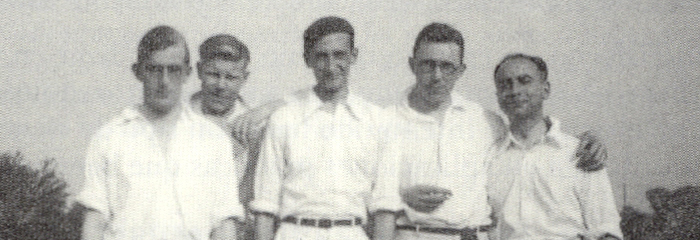
Albareda playing tennis during his stay in the United Kingdom in 1934.
source : José María Albareda y Herrera, Aragonese pharmacist
In 1935 he obtained a post at professor in Madrid, where the heads of chemical research had noticed him in order to promote a line of research in soil chemistry at the University. In 1936 Albareda proposed to the JAE that he should carry out another research stay in study centres in the United States, in California, Arizona and New Mexico, places with arid soils like those of Spain. In July 1936 he learned that he had been granted the scholarship but, that same week, the political collapse of the country made it impossible to go ahead with his plans: the conflict that would lead to a civil war that changed his life broke out.
After the military uprising and the subsequent revolution, Albareda remained a refugee in Madrid, writing a book on El suelo that he had begun months earlier. There he heard the news that his father and one of his brothers had been murdered in his home town by the exalted leftists in power there. He began to articulate an exile project : to gain France by crossing the Pyrenees. He did so by accompanying the founder of Opus Dei, Josemaría Escrivá, whom he had recently met in Madrid. Albareda had joined Opus Dei on 8 September 1937.
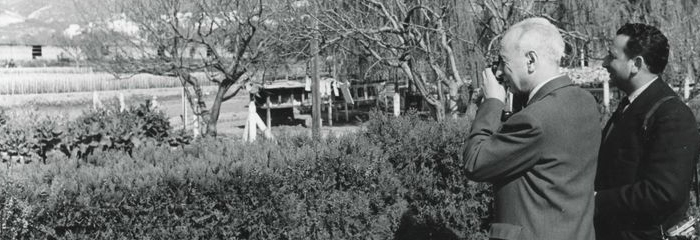
José María Albareda and Fernando Pinto Muñoz, photographer of the Institute of Agricultural Sciences, during the visit visit to a carnation plantation in the province of Barcelona.
source : AICA
He achieved his aim, and once he had been purged by the pro-Franco authorities, he was assigned to a post in a secondary school in Vitoria and in the incipient Ministry of National Education, and he entered contact with José Ibáñez Martín, who in August 1939 became Minister of Education. In several conversations with him, they discussed his idea of what scientific research should be, and from these meetings emerged the first projects of the institution that would take over from the JAE, what would end up being called, committee Superior de Investigaciones Científicas (CSIC), created in 1939 and of which Albareda would be University Secretary. In 1940 he obtained a chair at the Complutense University of Madrid.
His dedication to the CSIC marked his life intensely: he died in 1966 while he was still at the CSIC University Secretary. By then the CSIC had grown considerably, Albareda had published four books - among them Consideraciones sobre la investigación científica - and more than two hundred articles in specialised journals. He was appointed honorary doctor by the Universities of Louvain and Toulouse, and received academic honours in Spain and abroad. In 1959 he was ordained a priest and the following year he left his chair in Madrid to occupy Office of the Executive Council at the University of Navarra. In all these stages, he never ceased to cultivate his study of soils, and formed the first generation of Spanish specialists in the field subject.
|
|
|
Prof. Pablo Pérez López
Full Professor of Contemporary History
University of Navarra
For more information:
Pérez-López, Pablo, "José María Albareda en los comienzos del committee Superior de Investigaciones Científicas (1936-1949)", in Jesús Longares Alonso: el maestro que sabía escuchar, Pamplona, Eunsa, 2016, pp 203-229. (.pdf)
Pérez López P (2010) José María Albareda. Science at the service of God. Nuestro Tiempo Nº 665.

